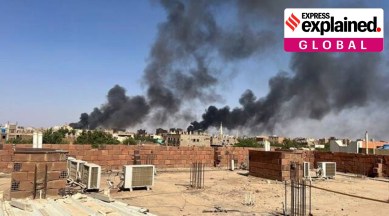Fighting rages on in Sudan, 3,000 Indians stuck: A quick guide to the latest developments
Evacuation of foreign nationals, including around 3,000 Indians, has so far not been possible from Sudan, with the situation unstable and airports unsafe.

Fighting continues to rage in Sudan, with over 400 dead, 3,000 injured, many displaced, and an attempted Eid ceasefire coming to nought.
On Saturday (April 22), the Sudanese army said it was coordinating efforts to evacuate diplomats from the United States, Britain, China and France out of the country on military airplanes, reported AP.
Around 3,000 Indians are among the stranded foreign nationals, and a 48-year-old from Kerala, Albert Augustine, has been killed by a stray bullet.
While the army and RSF have so far not seemed ready for negotiations — raising fears of a civil war — on Saturday, army chief and effectively the country’s president, General Abdel Fattah al-Burhan, told Al Arabiya TV that the warring factions “need to sit as Sudanese and find the right way out to restore hope and life”, and that “everybody loses in this war”.
What has led to the conflict in Sudan?
The powerful RSF was formed in 2013, consisting mainly of the Janjaweed militias that had fought on behalf of the Sudan government during the War in Darfur in the 2000s. It is led by Mohamed Hamdan Dagalo, also known as Hemedti, and has been accused of human rights abuses.
As The Indian Express reported earlier, the roots of the current conflict go back to April 2019, when Sudan’s long-serving authoritarian President Omar al-Bashir was overthrown by military generals following countrywide protests against him. The protesters did not stop after power passed onto military generals, and demanded a democratic government.
This led to an agreement between the military and the protesters four under which it was decided to constitute a Sovereignty Council, a power-sharing body of military officers and civilians, which would lead Sudan to elections at the end of 2023. Abdalla Hamdok was appointed Prime Minister for the transitional period. However, the military staged a coup in October 2021, with Burhan becoming de facto leader. Dagalo, vice-president of the ruling council and Burhan’s partner in the military seizure of power, became the second-in-command. Burhan announced that the military would hold power until elections are held in July 2023.
Soon after the 2021 coup, relations between the military and the RSF soured. Dagalo, pitching himself as the real ‘leader of the people’, said the 2021 coup was a mistake.
Burhan and Dagalo disagree over how the 10,000-strong RSF should be integrated into the army, which authority should oversee that process, and who heads the army afterwards. Also, Dagalo wants to delay the integration for 10 years but the army wants it in the next two years.
Over the past few weeks, the RSF was redeployed around the country, which the army saw as a provocation. The building tension finally erupted into violent clashes, with rockets being fired on cities.
What does Sudan stand to lose?
The loss of lives, displacement, and damage to infrastructure is already running high. Sudan is among the poorest countries in the world, with an average annual income of $750 per head, and thus ill-equipped to ride out more shocks.
Now, with the fighting, the United Nations World Food Program has said that three of its employees have been killed in the fighting, and has announced an immediate suspension of all programmes in the country.
Also, Sudan’s movement towards democracy had raised hopes of other benefits. As the NYT reported, the country’s international isolation had just begun to end, with the United States lifting its designation as a state sponsor of terrorism, international aid being promised, and Russian overtures raising its geopolitical value. All of that now seems highly uncertain.